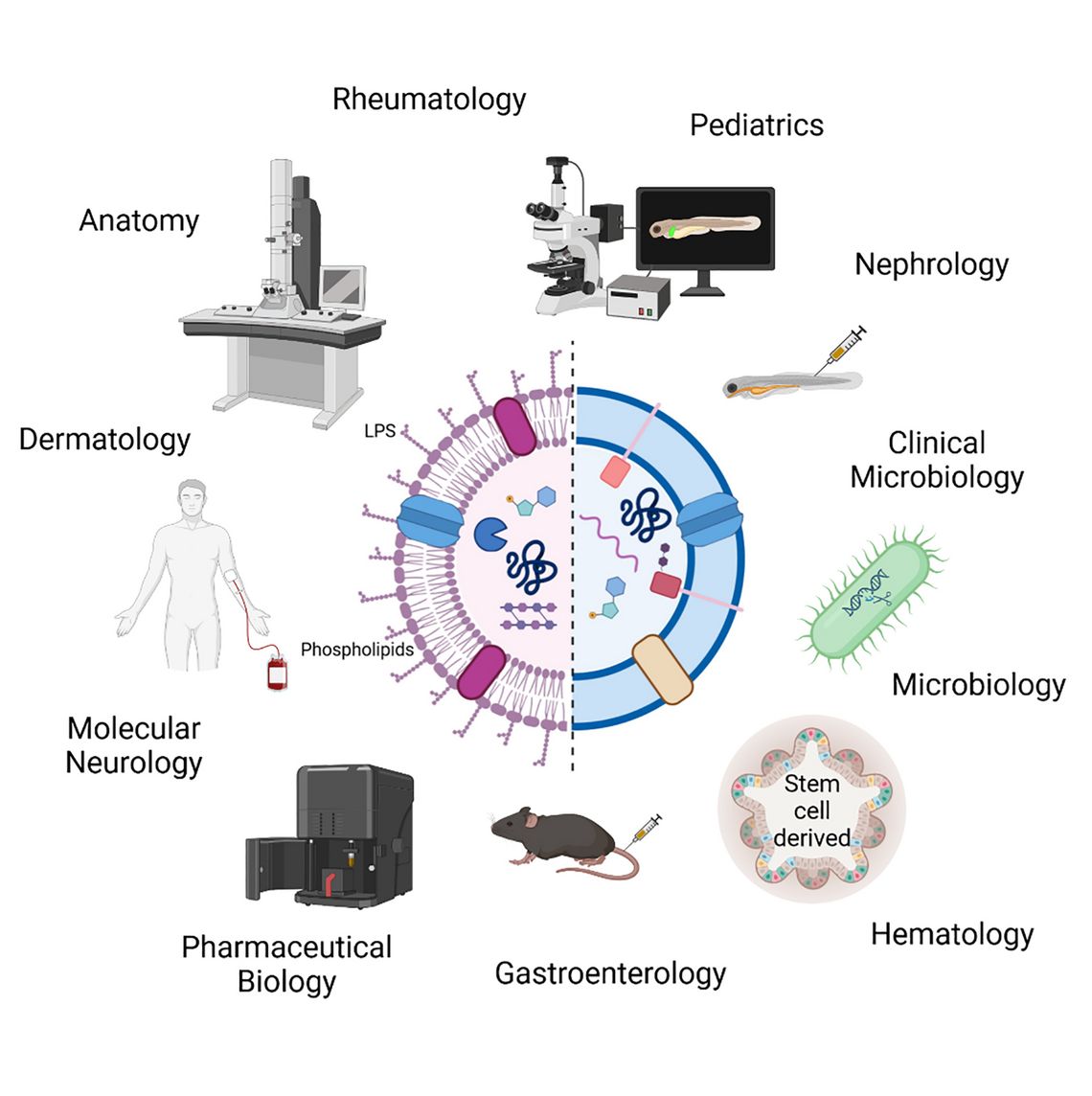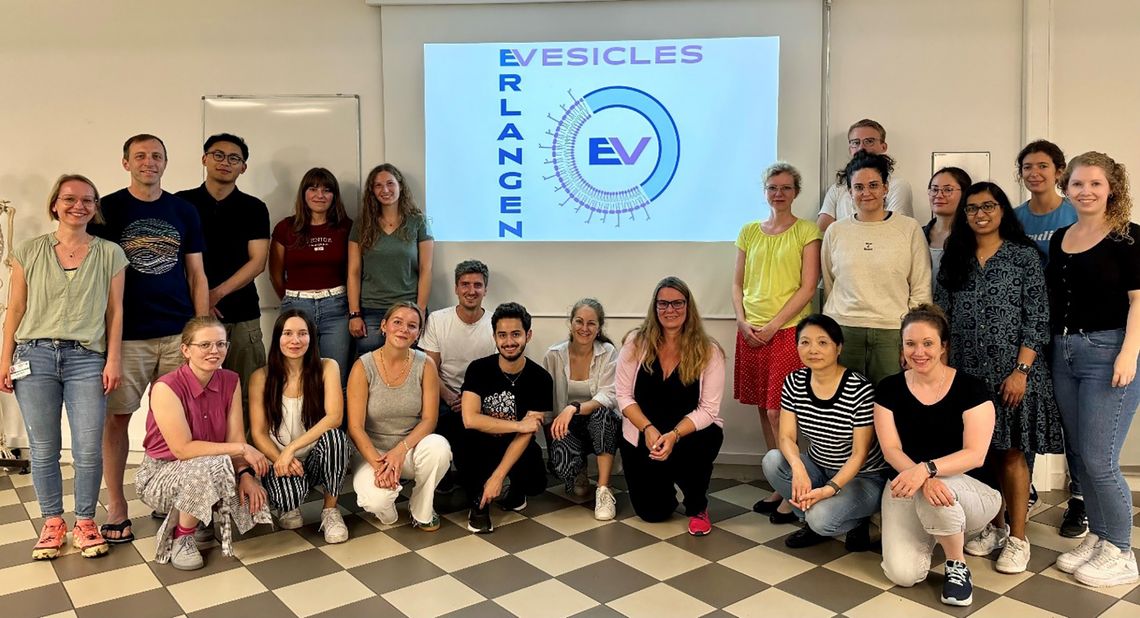Extracellular vesicles of different bacterial and eukaryotic origin: The Erlangen Vesicles
DOI: https://doi.org/10.47184/tev.2024.01.05State of the art research on extracellular vesicles (EVs) that adheres to the guidelines provided by the International Society for Extracellular Vesicles (ISEV), demands expertise in different biochemical, imaging and biophysical methods. Additionally, it became clear in recent years that scientific questions related to EV touch many different research fields. This diverse methodological and scientific framework has led to increased network formation within the EV community in recent years. Various national and international initiatives were established to bring EV scientists together and develop joint research concepts. This has led, for example, to various national EV societies, of which GSEV is one. These national societies are very successful in providing platforms to discuss overarching goals and foster yearly exchange of research at annual society meetings.
Keywords: Bacterial and eukaryotic EVs, immune response, infection research, cross-disciplinary exchange.
To promote exchange on EV related research that affects every day lab-work, networks at local level are needed, enabling a much more intensive exchange of expertise. In the university city of Erlangen, such a local group the "EV - Erlangen Vesicles" has recently been established. This groups includes scientists from Friedrich-Alexander-University Erlangen-Nürnberg (FAU) and the University Hospital Erlangen. FAU, founded in 1743, is one of the leading research universities in Germany with almost 40,000 students and 6,600 employees. According to the THE Impact Ranking 2024, FAU is one of the most innovative universities in Germany and globally.
Prof Claudia Günther (Department of Medicine 1, University Hospital Erlangen) and Dr Philipp Arnold (Institute of Functional and Clinical Anatomy, FAU) initiated the Erlangen Vesicles in May 2023 and regular monthly meetings in a Jour Fixe format have been held since. On average, 25-30 scientists from many different fields and backgrounds attend these Jour Fixe meetings. In Erlangen, we have the unique situation that we have groups on site working on bacterial-derived EVs and on eukaryote-derived EVs . With a very strong focus on immune-mediated inflammatory diseases the Medical Faculty of the FAU and the University Hospital have a long-standing record in host-pathogen interaction. As EV from different origin can cross endothelial and epithelial barriers in health and disease many research questions arise around this complex. The groups from the Medical Faculty and University Hospital are joined by groups from the Natural Sciences, which bring invaluable research tools and methods to the initiative. The initial goal in finding the Erlangen Vesicles was to encourage researchers to share their EV-related protocols and methods for EV characterization and such foster methodological exchange. In the meantime, this methodological exchange lead not only to the exchange of methods for EV characterization such as transmission electron microscopy, nanoparticle-tracking analysis and biochemical characterization, but to the exchange of research models used in EV research. These include for example stem cell-derived organoid, in vivo application into mice and zebra fish, serum and plasma samples of different patient cohorts, isolation and genetic manipulation of patient derived bacterial strains and the exchange of EV isolates from different origin for testing in research models (Fig. 1).

Figure 1: EV centred research. Focussing on extracellular vesicles of different bacterial or eukaryotic origin the Erlangen Vesicles exchange methods and research tools to address EV related research questions. Researchers from diverse scientific and educational backgrounds provide invaluable insights into specific aspects of EV research and application.
Over the last year, manifold cooperation projects started, already leading to first shared publications. Within the Erlangen Vesicles community, we now also start to combine our scientific questions and results, to untangle broader EV related connections. To foster exchange in the field of EV research in Erlangen we follow some basic principles:
- Facilitate Cross-Disciplinary Exchange: Foster exchange and connect researchers working on EVs from different origin and background
- Identify Synergies for Collaborative Endeavors: Find synergistic starting points for scientific or technical cooperation, share OMICS data within the Erlangen Vesicle community
- Exchange and Harmonize Methods: Our platform serves as a conduit for the exchange of methods and best practices.
- Promote EV Research in Erlangen: We are committed to advancing the field of EV research within the Erlangen community. Through knowledge sharing, innovative discussions, and meaningful partnerships, we strive to make Erlangen a hub for cutting-edge research in the realm of EVs. All EV researchers at all levels of experience are welcome to our meetings
The Erlangen Vesicles are dedicated to educating the next generation of EV researchers that can then shape the emerging field of EV research and receive the best possible training with regard to international guidelines.
Bringing together scientists from different backgrounds and at different stages of their scientific career benefits all participants personally and helps to grow awareness for EV research locally and beyond.

